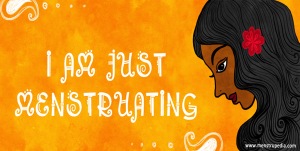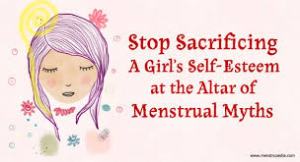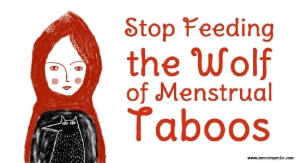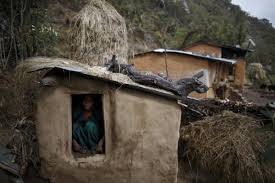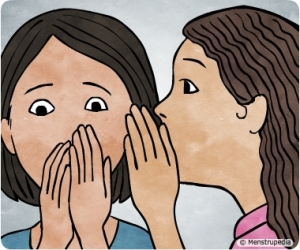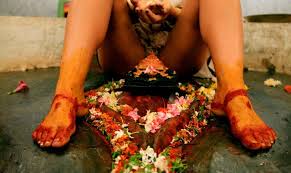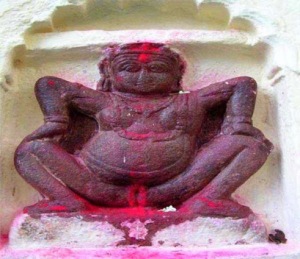My 14th spring of life, it was Tuesday evening; I came out of bathroom nervous, anxious as something happened. It was only two days remaining for my 8th grade first terminal exam to be over. So far, I had done exceptionally well in this exam. I can vividly recall the moment like yesterday. My underwear had tinge of blood stains. I realized I reached the peak of puberty and had my menarche. Immediately, I recalled the similar moment 2 years ago with my elder sister. She came crying out of bathroom stating what happened and was taken to one of our relatives’ home. She stayed there for almost about 7days, staying in dark room, wasn’t supposed to touch anything or anyone and was even forbidden to see the sun outside during the day. Forbidden things were considered punishable in one’s religion. In our visit she often cried for living in that seclusion. After the flash back of yesteryears for few moments, immediately I wanted to tell mom what happened. Then there came a voice inside me “Wait!! What are you doing? If you are going to tell mom, she will for sure keep you in seclusion and then there will be no exams. You might have to repeat your exam as well. It echoed further: Do you want to repeat that exam where you are sure to excel? Another voice immediately super ceded the first one “No, you got to tell mother at any cost. Even if you are going to give this exam, Devine lord is sure to punish you and you will certainly fail this exam.” A strong gush of dilemma crossed my mind. I took a deep breath and decided to make a choice. Choice to give my exams and reveal what happened after two days. However, within these two days I tried to maintain my own seclusion; I limited myself to the drawing room, refused to eat in kitchen with an excuse of exam, tried to sleep alone when I usually slept along with my granny. In my self-created solitude I cried ample of times and hated myself for growing up so early. I even avoided playing and talking with my brothers and father as we are not supposed to do so with male members of the family during this period. When my elder sister questioned my unusual behavior at times? My answer would be “stress due to exam”. After my last paper, I finally mustered that courage to spill the beans in front of my mom. I still remember the look on her face, typical expression mixed with Joy and sorrow. She must have been perplexed over the passage of time. It was like yesterday she held me for the first time and now it was already 14 years later I was grown up girl. She believed me to be lucky for the event didn’t occur prior to exam. Later that day, I was also the part of same rituals. However, along with that I was filled with guilt too. Guilt, that I committed a sin and shall be punished in hell. My studies will deteriorate in days to come and my future will be dark as hell.
Days passed by and the frequency of my nightmares regarding my result and my future increased. My self-esteem was severely damaged and I was no longer that confident, vibrant girl. A week later, my results were out, to my surprise I stood first and couldn’t stop crying. It wasn’t the first time that I had had that good results but this time it was entirely different. A month later I even participated in my first “Panchamiko barta”: a fasting ritual for women in their reproductive years, to absolve the sins committed during menstruation. Things didn’t end there; year after year I asked lord to forgive me for my sins and participated in those fasting rituals. I could never speak about my little secret with anyone. It was buried deep in my thoughts which echoed in the form of nightmares in years to come.
Most of my years of adolescence; a period of physical, psychological and social maturing from childhood to adulthood was full of that guilt. Adolescent female populations are an important portion of reproductive age group. Female adolescent population (10-19 years) constitutes 23.41% of total female population of Nepal. 1
According to Wikipedia, a menstrual taboo is any social taboo concerned with menstruation. In some societies it involves menstruation being perceived as unclean or embarrassing, extending even to the mention of menstruation both in public (in the media and advertising) and in private (amongst the friends, in the household, and with men). Many traditional religions consider menstruation ritually unclean.2
A data from the central Beaureu of statistics in 2011 shows that menstruation is still perceived and practiced as taboo by 58% of the population. This was in 2011, almost 10 years after when I had my first menarche. Also in a study conducted in 2014 in Far western Nepal, large proportion of women still believe in unscientific myths which lead to different health related problem but only 24% of women perceived menstruation as natural process.3 This depicts that the rural area is more affected and swamped by these menstrual taboos.
There is variance in the practice of the taboo in the different caste and culture within nation itself. According to baseline survey report of Save the Children Fund (SCF) about 89.42% of the population still practiced the system of chhaupadi in Doti district. For people who are unaware regarding Chhaupadi, it is an interesting but highly discriminatory social tradition in the western part of Nepal for Hindu women which prohibit a woman from participating in normal family activities during menstruation because they are considered impure. The women are kept out of the house and have to live in a shed. This lasts between ten to eleven days when an adolescent girl has her first period; thereafter, the duration is between four and seven days each month. Childbirth also results in a ten to eleven-day confinement. During these most vulnerable periods of menses and childbirth women are considered to be untouchable. There are various discriminatory practices related to “CHAUPADI” that are detrimental to sexual and reproductive health and safety of young female adolescence. Even though it was outlawed by the Supreme Court of Nepal in 2005, but it is still highly prevalent in the rural far western part of Nepal.4
Meanwhile various studies have also revealed that menstruation is the major contributing factor in absenteeism and poor academic performance among school girls. A shocking data revealed that around 70.7% girls do not attend the school during their period 5. I can relate to the finding of this study to the regular absenteeism of some of my friends during school days. On asking further, they would simply give varied reasons as in our society menstruation is the topic of secrete gossip and it is additionally surrounded by many myths and restriction in place of residence, dietary intake and activities of daily living.
Various studies across the globe and especially in our part of setup suggests that although people aware of these all consequences, they are not able to avoid it for many years because of strong superstitious belief of mishaps for not practicing these rituals. Drawing reference from my case, my mom although being an educated and working lady she strictly followed these rituals. I hate to tell my mom superstitious but yes she is fully indoctrioned in this regards.
There other studies which have also shown that educational status can modify these rituals and practices in an individual, especially among young women. Therefore there is the necessity to make the community people aware of these malpractice and should emphasized in school curriculum. Having said this, unfortunately the lectures or chapters on sexual and reproductive health were largely untouched by the concerned teachers in my days. As for me things changed and my perception too as I joined nursing as my undergrad studies. I started to take menstruation as more natural and physiological and my guilt was long gone when I excelled academically. I learnt and was imparting knowledge on menstrual hygiene and unraveling myths in the community where I was posted.
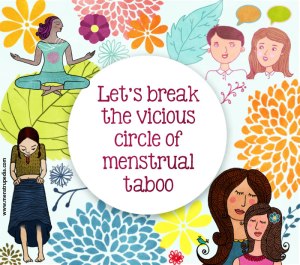 The guilt of committing a sin had long gone but the guilt of lying my mom still remained fresh. Not only that, not have been able to share it with anyone for varied obscure reasons was also an added guilt. As graduate student of women health and development, one day we had a small discussion in our qualitative research class regarding the experience of menarche. Amidst all those stories filled with laughter, joy and tears. I had my vindication. I shared my story in front of more than 20 people. Later that evening I even shared with my mom. I was unapologetic. I was free. She was still very angry with me that day and following days to come. Still to date she reminds me that event as my disrespect to her. It took me more than 10 years to fully come out of that guilt.
The guilt of committing a sin had long gone but the guilt of lying my mom still remained fresh. Not only that, not have been able to share it with anyone for varied obscure reasons was also an added guilt. As graduate student of women health and development, one day we had a small discussion in our qualitative research class regarding the experience of menarche. Amidst all those stories filled with laughter, joy and tears. I had my vindication. I shared my story in front of more than 20 people. Later that evening I even shared with my mom. I was unapologetic. I was free. She was still very angry with me that day and following days to come. Still to date she reminds me that event as my disrespect to her. It took me more than 10 years to fully come out of that guilt.
I still believe there are many more young girls like I used to be, buried in the guilt and shame of something so natural and physiological. Universal truth is that we bleed each month; it is our biological identity as females (Exception in some medical conditions). Our womb is pure source of human life. Every month it signifies our capacity to produce life and at the same time our true choice if we wish to bleed every month for the rest of life or we create a next life within. At some places it is even considered holy as there are temples created signifying mensuration.
However, people still shy and shun the talks regarding menstruation. Even educated people of my generation do that. Sexual and reproductive health and its knowledge should be imparted at an early age, even before menarche so that these young girls wouldn’t have to stake their self-esteem and confidence while growing up unlike boys who don’t face such setbacks. A single approach wouldn’t work. We need to call for united multisectoral coordination in dealing with this taboo and making menstruation normal. Talking about it, writing about it, speaking about it and using platform of social media can play a huge role in debunking that guilt of bleed which in inbuilt.
By Smriti Thapa
- Central Bureau of Statistics. (2012). National population and housing census 2011(national report).CBS: Kathmandu, Nepal.
- https://en.wikipedia.org/wiki/Menstrual_taboo
- https://en.wikipedia.org/wiki/Chhaupadi
- Adhikari, P., Kandel, B., Dhungel, S. I., & Mandal, A. (2007). Knowledge and practice regarding menstrual hygiene in rural adolescent girls of Nepal. Kathmandu University Medical Journal, 5(19), 382-386. Retrieved fromhttp://www.kumj.com.n

